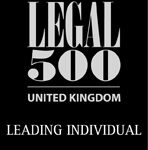Background
Jane Deighton is one of the founding Partners of Deighton Pierce Glynn. She is now a Senior Consultant. She previously co-founded Deighton Guedalla in 1987, having qualified as a solicitor in 1985 at Seifert Sedley Williams.
Expertise
The Chambers and Partners Legal Directory classifies her status as “a senior statesperson”. They add: “Hailed by sources as an “excellent” lawyer, Jane Deighton is endorsed as a “fierce opponent and tenacious” advocate who “works extremely hard” for her clients” …. “Lauded as “a legend “in the field, Jane Deighton is reputed for her work in the Undercover Policing Inquiry. Commentators say: “Nothing fazes her; she is an incredible fighter on behalf of her clients.” They described her as “a seasoned and respected practitioner who peers cite as an inspiration for the level of her commitment to civil liberties work”, “as always brilliant, with an enviable reputation for her work in high-profile matters”.
Jane works with people who have been discriminated against or otherwise wronged by National institutions. Jane is a pioneer in actions against the police and deaths in custody. Among those she represents are bereaved families and, at the Undercover Policing Inquiry, core participants who have been spied upon. At the Hillsborough Inquests, Jane represented an ambulance officer who was sent almost single-handed onto the pitch. She also advises progressive politicians.
On 5 May 2020, Jane and Lord Hendy QC published an article to support campaigns for safe work places during the COVID pandemic. Jane specialises in employment and criminal law. She has secured record-breaking financial awards of their times for her clients – in both claims of sex discrimination against a local authority, and race and sex discrimination against the police.
Victims of Crime – police failures
Jane continues to represent Duwayne Brooks OBE, the friend of the murdered black teenager, Stephen Lawrence. They proved at the Stephen Lawrence Inquiry that the police treatment of Mr Brooks was largely as a result of discrimination and racist stereotyping. The police had failed to treat him as a victim, respect his evidence, and to investigate the attack that day with any degree of competence. Their efforts were fundamental to the Inquiry’s understanding of the role of race within the police investigation and to the rehabilitation of Mr Brooks’ well-being and reputation. Subsequent successful private law actions against the police arising out of their treatment of Duwayne secured substantial damages.
Her practice includes working with anti-racist organisations and many victims of crime failed by the police and Crown Prosecution Service. A common theme has been securing redress for the unlawful arrest of black families who themselves had sought police assistance as victims of crimes, such as racist abuse and assault, and reversing the failure of the police to arrest the white perpetrators of the crime. Jane brought the first claim under the Race Relations Act about the failure of the police to answer a 999 call from a black Somali girl as effectively as they answered a call from her white harassers. She brought the first claim which established that treatment of witnesses seeking to assist the Crown Prosecution Service were protected under the Race Relations Act.
In circumstances where the police had failed to prosecute the killer, Jane brought the first High Court civil case for damages for assault leading to death. She represented the Mother, Granny and Aunt of a murdered teenage girl. This action secured an award of damages, but more importantly, the police thereafter prosecuted the correct offender for murder, and he is now in jail.
Jane uses the Equality Act, as well as the Human Rights Act, to challenge the incompetent and discriminatory investigation of rape and crime against vulnerable persons by the police. The first claim of its kind about discrimination on the basis of sexual orientation against both the police and the Independent Police Complaints Commission, arising out of their failure to treat a gay complainant about homophobic abuse appropriately, has recently been successful.
Deaths in Custody
Jane has worked for 20 years representing the families of those who have died in custody or at the hands of the police. The families’ goals vary but are often “justice” – which can encompass securing an independent and effective investigation into the death so that they fully understand what happened, prosecutions, disciplinary procedures, policy changes, damages, apologies and publicity.
Jane is vigilant in persuading investigating authorities to carry out an investigation of equal rigour to that which is carried out when homicide suspects are civilians. She successfully challenged investigators by way of judicial review in the High Court in innovative cases where the families felt the suspect police officers were being helped too much by the investigators. One challenged the amount of disclosure the investigators proposed to give to the suspect police officers before they were interviewed; another challenged the failure of the investigators to prevent police officers who may be suspects from talking to each other prior to writing down their accounts of the killing. This resulted in the investigation guidelines being rewritten by the Association of Chief Police Officers.
Much of Jane’s work is representing bereaved families at Inquests. Inquests are enquiries into how, why and when the deceased died, and Jane’s focus is to ensure that her clients’ questions are answered. Jane not only represents the families in Court but works to ensure that the Coroner and investigators gather the evidence, and that that evidence is made available to the families well in advance of the hearing. Where necessary Jane has challenged the Coroner and investigators by way of judicial review in the High Court.
Bereaved families can claim damages from those responsible for their loved one’s death. Jane regularly pursues damages claims to very successful conclusions.
She also persuaded the House of Lords (as it was then) to permit bereaved families to use the civil process to investigate and secure a Court ruling in relation to a police killing as this was the family’s priority – even though they had already been offered greater damages than a Court would award.
Actions against the police and Ministry of Justice and others
Huge high-profile cases are not Jane’s only work. She likes to work with clients who have suffered discrimination or malpractice of any sort by the police, Ministry of Justice and other institutions who wield power over people. She emphasises the importance of working out with her clients what they want to achieve – financial compensation, apologies, policy changes, practical improvements, disciplining of officers, meetings, publicity – and uses her skills to achieve their goals. Jane is particularly keen to help clients facing the kind of misconduct that is also experienced by others with the aim that not only will her client feel satisfied, but the case will deter the wrongdoers from behaving the same way in the future. She secured, for instance, substantial damages for a black man who was stopped driving an expensive car and held on the roadside for just a few minutes. The police argued it was a lawful stop under the Road Traffic Act, Jane argued it was unlawful because her client was stopped simply because he was a black man in an expensive car.
Other work
Jane represents clients at or against the Press Complaints Commission, Professional Regulation Bodies and Tribunals and the General Council of the Bar. Jane has spoken at a large number of conferences, campaign meetings and seminars both nationally and internationally. Jane has also been sought out to train lawyers and organisations on topics such as race and the criminal justice system and run practical legal workshops on discrimination, mediation, and actions against the police.
She has acted for exiled African National Congress members, and death row inmates in Trinidad and Tobago. She worked for trade unions, national and international progressive movements including the NUM during the Miners’ Strike, SOGAT during the Wapping print press strikes, and the women protestors during the Greenham Common Women’s Peace Camp. She has a history of representing workers – particularly those who have been discriminated against by their employers.
Jane has featured on most national TV and radio outlets, and in national and local newspapers. She has written reports on Emergency Powers in Northern Ireland and on the Human Rights situation in Malawi for the Law Society.
Jane is a founding member and former Chair of the Police Actions Lawyers Group, as well as a member of the Haldane Society of Socialist Lawyers, Amnesty and Greenpeace.
Sample Cases
Significant cases in which Jane Deighton has acted include:
ZF v Commissioner of Police for the Metropolis – established Race Relations Act protected victims of crime who asked for help from the police
DB v Commissioner of Police for the Metropolis – established Race Relations Act protected even those victims of crime who were not actively seeking the services of the police and secured substantial damages
GG v Chief Constable of Thames Valley Police – killing of son by police – prosecution – civil claim
JA v Chief Constable of Sussex Police – prosecution – civil claim – succeeded in House of Lords
The Inspire – Inquest Jury returned an unlawful killing verdict in relation to a fisherman drowned when a wave caused by a submarine led his fishing boat to sink
RP v Commissioner of Police for the Metropolis – successful claim by family arising out of their brother’s killing at an anti-fascist demonstration in London.
JC & MO v Lord Chancellor – claim for indirect race and sex discrimination for appointing his white male friend as a special advisor successful at ET and EAT level
EM v London Borough of Southwark – largest award for sex discrimination of its time
SL v Commissioner of Police for the Metropolis – largest award for sex and race discrimination of its time, and agreements to make changes in practice
VB and RB v Home Office – civil claim arising out of death of daughter and Inquest which established serious failings by prison staff
R (on application of CP) v Chief Constable Northamptonshire Police and HM Coroner for Birmingham and Solihull – secured full disclosure pre-Inquest to bereaved family
DG c Commissioner of Police for the Metropolis – largest award of its time for assault and false imprisonment made by a jury (but later revised by CA)
RELATED NEWS



